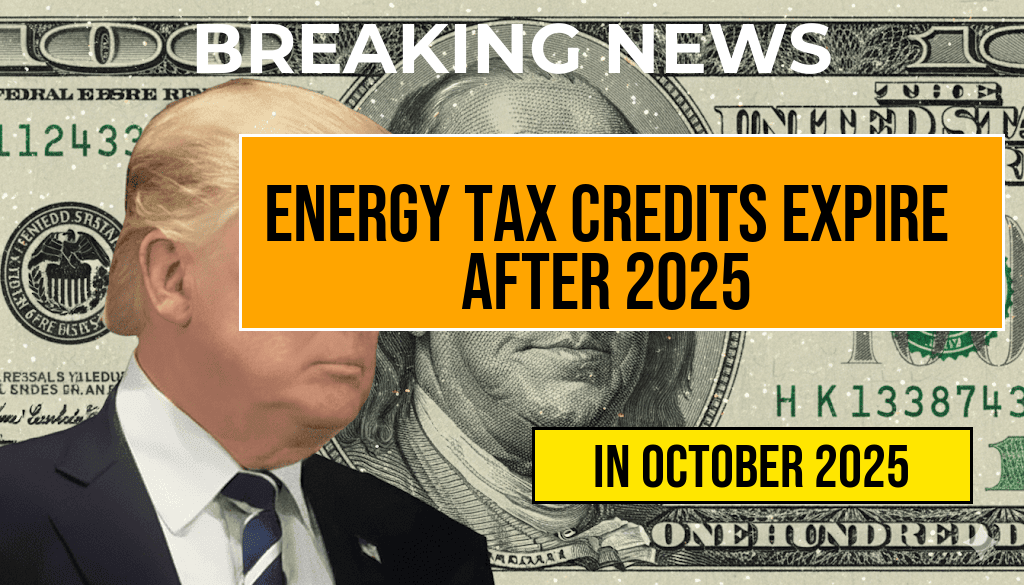The landscape of residential energy tax credits is poised for significant change, as many of the incentives aimed at promoting green energy adoption are set to expire after 2025. These tax credits have played a crucial role in encouraging homeowners to invest in renewable energy technologies, such as solar panels, wind turbines, and energy-efficient appliances. With the impending expiration, experts warn that the urgency to act is mounting, as homeowners may miss out on substantial financial benefits designed to ease the transition to sustainable energy sources. As the deadline approaches, discussions surrounding the future of these incentives are becoming increasingly vital to ensure continued momentum in the green energy market.
Current Landscape of Residential Energy Tax Credits
Residential energy tax credits have been instrumental in reducing the financial burden on homeowners who wish to invest in renewable energy systems. Currently, the most notable incentives include the Investment Tax Credit (ITC) for solar energy systems and various state-specific programs that offer additional benefits. These programs allow homeowners to deduct a percentage of the installation costs from their federal taxes, making renewable energy more accessible and affordable.
Investment Tax Credit (ITC)
The ITC enables homeowners to receive a tax credit of up to 26% of the installation costs for solar energy systems. This percentage is set to decrease to 22% in 2023 and is scheduled to expire entirely for residential installations after 2025. The ITC has significantly influenced the solar market, leading to a surge in installations across the country.
Impacts of Expiration on Homeowners
As the expiration date looms, homeowners are urged to consider their options carefully. With the potential loss of tax credits, the financial incentives for adopting renewable energy systems could diminish, potentially slowing the growth of the green energy sector.
- Increased Installation Costs: Without the ITC, homeowners may face significantly higher out-of-pocket expenses for renewable energy systems.
- Market Slowdown: The reduction in incentives could lead to a decrease in demand for solar installations, affecting jobs in the renewable energy sector.
- Environmental Impact: A slowdown in green energy adoption could hinder progress toward national and global climate goals.
State-Level Incentives
In addition to federal tax credits, many states offer their own incentives for homeowners investing in green technologies. These can include rebates, grants, and additional tax credits. However, as federal incentives fade, the sustainability of state programs may also come into question, especially in states that rely on federal support to fund their initiatives.
Advocacy and Future Legislation
Environmental advocates and industry leaders are actively lobbying for the extension of these tax credits. They argue that removing financial incentives could reverse years of progress in the renewable energy sector. Campaigns are underway to encourage lawmakers to consider new legislation to either extend the existing incentives or introduce new programs that would continue to support homeowners looking to invest in green technologies.
Public Awareness and Education
As the expiration date approaches, public awareness campaigns are critical. Homeowners must be informed about the potential loss of these tax credits and the implications for their energy choices. Industry stakeholders and environmental organizations are working together to disseminate information through seminars, workshops, and online resources.
What Homeowners Can Do Now
Time is of the essence for homeowners considering renewable energy installations. Here are some actions that can be taken:
- Consult with Professionals: Homeowners should seek advice from energy consultants or solar providers to understand the best options available before the credits expire.
- Evaluate Energy Needs: Assessing current energy consumption can help determine the most suitable renewable energy solutions.
- Act Quickly: If feasible, making a decision to install systems before 2025 could lead to significant savings.
Conclusion
The impending expiration of residential energy tax credits after 2025 signals a crucial moment for homeowners and the renewable energy sector. As advocates push for legislative changes, the future of green energy incentives remains uncertain. Homeowners must act swiftly to take advantage of existing incentives while they last, ensuring that the momentum towards sustainable energy solutions continues unabated.
For more information on residential energy tax credits and their impacts, visit Energy.gov, or explore detailed insights on green energy policies at Forbes.
Frequently Asked Questions
What are the Residential Energy Tax Credits?
The Residential Energy Tax Credits are financial incentives provided by the government to encourage homeowners to invest in renewable energy systems, such as solar panels, wind turbines, and energy-efficient appliances.
When do the current Residential Energy Tax Credits expire?
The current Residential Energy Tax Credits are set to expire after the year 2025, which means homeowners looking to take advantage of these incentives should act before that deadline.
What types of green energy systems qualify for the tax credits?
Eligible systems for the Residential Energy Tax Credits include solar energy systems, wind turbines, geothermal heat pumps, and energy-efficient windows and doors.
How can homeowners claim the Residential Energy Tax Credits?
Homeowners can claim the Residential Energy Tax Credits by filing the appropriate forms with their federal tax returns, usually including Form 5695, which details the costs of the eligible energy improvements.
What happens after the Residential Energy Tax Credits expire?
After the Residential Energy Tax Credits expire in 2025, homeowners may lose the financial incentives that encourage investment in green energy systems, potentially slowing the adoption of renewable energy technologies.

Leave a Reply